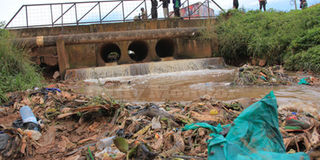Prime
Put an end to kaveera use once and for all

Polythene bags (Kavera) and plastic bottles pile in a drainage channel in Kiwempe Zone, Makindye Division, Kampala, on August 4, 2021. PHOTO/RACHEL MABALA
What you need to know:
- The issue: Kaveera ban.
- Our view: With government making fresh commitments to putting an end to kaveera use, all this will be mere rhetoric if no action is taken.
- Without a practical plan, we could as well wait for another promise to ban the same 10 years from now.
The production, importation and use of polythene bags in Uganda is banned – for the second time. The Cabinet decision banning polythene bags, commonly known as kaveera, was announced last week by State minister for Environment Beatrice Anywar.
It has been more than 12 years since the July 2009 total ban on plastic bags “for the conveyance of goods and liquid to protect our environment”.
Kaveeras are the most commonly used shopping bags in Uganda. Goods in any quantity ranging from drinking water in small shops at trading centres, to food in restaurants and groceries in large supermarket chains are served in kaveeras. The result has been a land covered in kaveera.
The poor disposal of polythene bags means an environmental danger to both humans and animals.
Scientists warn that micro-plastics entering the human body through ingestion or inhalation can lead to an array of health implications, including inflammation, genotoxicity and oxidative stress.
With agriculture being the backbone of our economy, polythene bags do not only degrade our soil, but also endanger our animals that sometimes get entangled, or accidentally eat the polythene.
This is not to mention the toxic substances that are released into the soil when kaveeras decompose under sunlight. When burnt, these kaveeras also discharge toxic substance into the air, causing air pollution.
With government making fresh commitments to putting an end to kaveera use, all this will be mere rhetoric if no action is taken. Without a practical plan, we could as well wait for another promise to ban the same 10 years from now.
A story by this newspaper this week revealed that absence of alternatives to polythene bags was among the biggest hindrances to the first ban.
Alternative eco-friendly bags made from material such as fabric, natural fibre and paper should be made readily available and affordable to the public.
Then besides regulation, government should systematically phase out the use of polythene bags so as to limit the impact of the elimination of the industry on the economy. A lesson learnt from hasty implementation of the first ban was that investors who had sunk a lot of money into the industry had not been thought of, or the jobs that were going to be lost.
Finally, there must be a deliberate campaign to enlighten Ugandans on the dangers of using polythene bags, so as to change their mindset.
Otherwise, pronouncements without alternatives will lead us back to where we started from.



